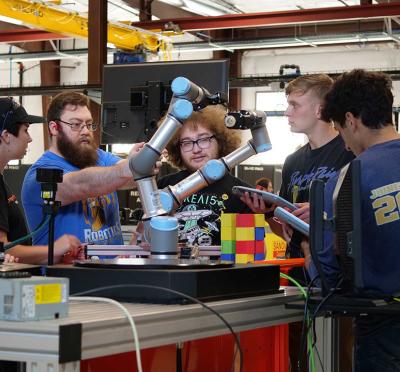Additive manufacturing (AM)—also known as 3D printing—is rapidly disrupting the manufacturing sector, providing freedom of design, allowing a transition from rapid prototyping to real commercialization, decreasing material waste, and reducing time and cost of manufacturing. Furthermore, AM methods can be utilized for manufacturing of functionally graded materials (FGMs).
Unlike the conventional homogenous materials, FGMs are characterized by transitions in design, microstructure, texture, and properties that can be obtained at relatively small or large length scales, depending upon the functional gradient desired in a particular application.
Somayeh Pasebani, assistant professor of advanced manufacturing, is working to advance research in metal additive manufacturing, focusing on new techniques such as selective laser melting (SLM). Technologies like SLM allow for engineers to create objects with detailed control over process parameters, and part geometry and structure that would have been impossible just a few years ago.
Using a materials design approach, Pasebani and her research group couple experimental research with theory and mechanistic modeling for the accelerated and innovative development of alloys and metal matrix composites that can be manufactured by additive manufacturing. In doing so, they are developing the tools that will overcome the limitations of conventional and current additive manufacturing.
The practical applications of this research will be far-reaching—from high temperature oxidation and corrosion resistant parts for extreme environments such as energy sectors, aerospace, or nuclear reactors to implementation in tooling industry.
She collaborates with several faculty members across the College of Engineering as well as companies such as HP, ATI, and Daimler Trucks, with support from research grants from the RAPID Institute, Oregon Metals Initiatic, and Oregon Manufacturing Innovation Center.




